German scientist bred pigs to transplant human hearts
The German scientist's plan is based on the world's first genetically modified pig heart transplant to humans in the US last month, but with a simpler version.
German scientists plan to breed and then breed genetically modified pigs to donate hearts, with a simpler version based on the case of animals genetically engineered in the US last month in a pig heart transplant. for the world's first, according to the Guardian.
Eckhard Wolf, a scientist at Ludwig-Maximilians University (LMU) in Munich, says his team aims to make the new species, modified from the Auckland Island pig breed, ready for transplant trials. in 2025.
In the first surgery of its kind, a team at the University of Maryland School of Medicine last month transplanted a pig heart with 10 genetic modifications into a terminally ill man.
Doctors say the patient is responding well, although the risks of infection, organ rejection or high blood pressure remain.
"Our intention is to do a simpler model, specifically with five gene edits," Wolf said.
This scientist's plan has sparked huge controversy in a country with one of the lowest organ donation rates in Europe while animal rights movements are strong.

Mr. Eckhard Wolf with pigs at the Badersfeld experimental farm in Oberschleissheim, Germany.
Mr. Wolf has been working on animal-to-human transplants - called xenotransplants - for 20 years. The scientist says his team will use rudimentary cloning technology to create an 'initial generation' from which future genetically similar generations will be bred.
That first generation will be born this year and their hearts will be tested on baboons before the team seeks approval for human clinical trials in two or three years' time, said Wolf. let me know.
Transplantation will be done for people with organ failure who have no other treatment options. The waiting list for such patients already numbered about 8,500 in Germany by the end of 2021, according to data from the country's Organ Transplantation Organisation.
Wolf's supporters say his plan could help shorten that list, but opponents say the method violates animal rights, turning pigs into organ 'factories' while others say it's not. Monkeys used in transplant experiments must die in agony.
In February 2019, a petition by the group of Doctors against Animal Experiments in Germany asking for a ban on xenotransplant transplant research, gathered more than 57,000 signatures.
Kristina Berchtold, a spokeswoman for the Munich branch of the German Association for Animal Welfare, called the practice 'very morally questionable'.
She said: 'Animals should not be used as backups for humans. Pets, farm animals, animals bred or born in the wild all have similar needs, fears and interests.
- Successfully implanted artificial hearts for humans
- Baboons carry pig hearts for more than two years
- Head transplants can take place in China
- Phu Tho: Successfully bred F1 F1 wild boars
- Why can't we have a brain transplant?
- Breeding human heart
- In the next 10 years, artificial heart can replace heart transplant surgery
- Pigs contain omega-3 fatty acids
- Misunderstandings about pigs that people have
- Discover shocking animal hearts
- 6 animals that possess the heart
- Close relatives of humans survived after ... pig heart transplant
 13 causes of non-itchy rash
13 causes of non-itchy rash How the mouse with human ears changed the world?
How the mouse with human ears changed the world? The truth about 'fried rice syndrome!
The truth about 'fried rice syndrome! What is dental implant?
What is dental implant?